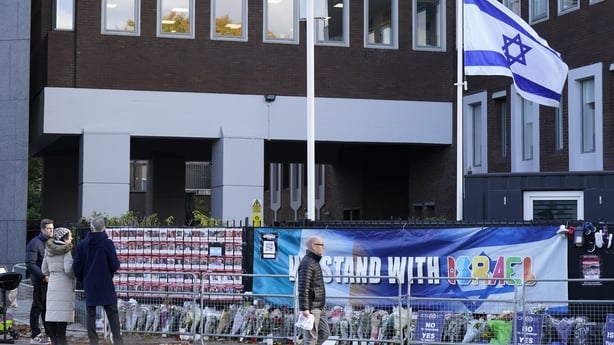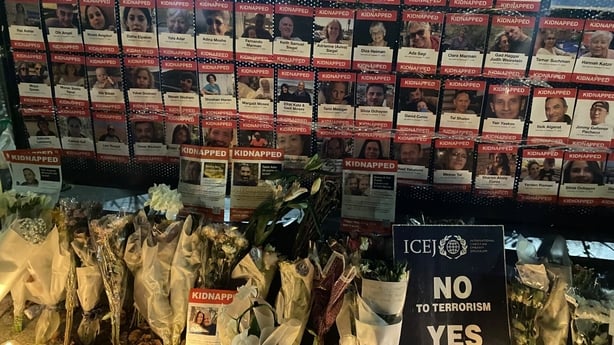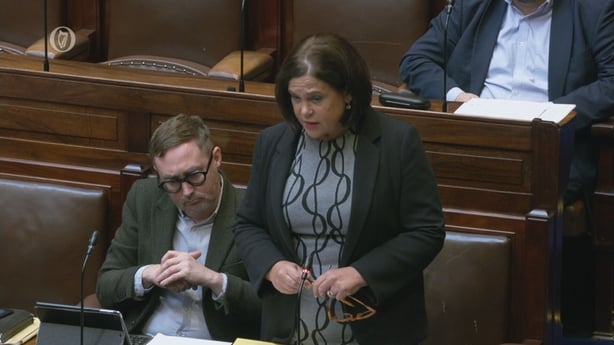The Israeli Ambassador in Dublin has said she does not believe Ireland is politically neutral in respect of the Israel-Hamas conflict, as she warned of a rising "wave of antisemitism" internationally.
Dana Erlich was speaking after a screening of footage for reporters at the Israeli embassy that showed the 7 October attack by Hamas on southern Israel.
She said the footage, which included an attack on a kibbutz and the Re'im music festival, was "historically important".
Ms Erlich said: "It is the most horrific attack on Jewish people since the Holocaust."
She said the footage in the 43-minute video was collected from the cameras of victims, emergency personnel, and dead Hamas operatives.
Reporters were told that the footage depicted the killing and dead bodies of 138 people, which the embassy said was less than 10% of the total killed on 7 October.
Ms Erlich said she wanted TDs and Senators to view the footage at another screening.
Asked about how the Irish-Israel relationship has developed since 7 October, the ambassador responded: "This horrible terror attack shows terror knows no borders."
Ms Erlich, who took up the Dublin role less than three months ago, said she was familiar with pro-Palestinian sentiment throughout Ireland and political parties.
However, she said she was "surprised" by the public reaction to the Hamas attack and the ongoing conflict.
She said she did not hear protesters condemn Hamas or call for the release of hostages.
Ms Erlich said Jewish people are becoming more concerned for their safety, adding there was a "wave of anti-Semitism rising" internationally.
Taoiseach Leo Varadkar said last week that Israeli's response to the Hamas attack was becoming "something more approaching revenge" rather than self-defence.

The ambassador said Jewish people in Ireland were afraid to speak up publicly about the conflict, even in a "balanced way".
She said that protesters chanting "from the river to the sea, Palestine will be free" was a call for the elimination of Israel.
Asked if the perception of Ireland being pro-Palestinian meant it could play a role as an interlocutor in resolving the conflict, Ms Erlich said she did not know if Ireland "wants to play that part".
She said nations who take that position are usually not aligned with "any side in particular" and need to be critical of both parties.
She said she understood that Ireland was militarily neutral, but added: "I don't think it is politically neutral."
The ambassador said she had seen more persistent criticism towards Israel from Ireland.
Ms Erlich said that there were still rocket and missile attacks on Israel every day, adding: "It seems like people here forget that."
She said she recognised that Government figures had issued "strong condemnations" of Hamas' attack.
"We are fighting this terror together," she said.
Asked if she hoped the footage would change the Government's rhetoric on the conflict, Ms Erlich said she wanted to invite politicians to view the footage at a later date and part of the role of the embassy was to strengthen diplomatic relations.
"That is why we are here," she said, adding that the embassy was ready to answer "difficult questions" about the conflict.
She said private screenings of the footage being carried out globally are to "bear witness" and "make sure the world knows" about the extent of the Hamas attack.
She called on Ireland to remember Irish-Israeli citizen Kim Damti, who died after the music festival attack, and eight-year-old Israeli-Irish girl Emily Hand, who is believed to be a hostage of Hamas in Gaza.
Ms Erlich said she had been in contact with Emily's father Tom and her sister Natali about the family's "tragic" experience.
She said: "We will do anything we can to help speed their release."

A candlelight vigil has been held outside the embassy to remember the victims of the 7 October attack and call for the hostages to be released.
A one-minute silence was observed while photographs of the hostages lined the wall outside the embassy.
The Israeli Action Coalition group said the vigil was to show solidarity and demand the release of all kidnapped individuals, including Emily.
Ms Damti was also remembered and her aunt, who was among those gathered at the vigil, said: "At least we know where Kim is, all these people not knowing where their families are, it's horrific."
Hazel Pigott visited Kim and her family in Israel just weeks before her niece was killed.
Clutching a photograph taken of Kim in Glendalough this summer, Ms Pigott described her as a beautiful girl who was about to go travelling with friends.
Israeli citizen Asaf Wexler attended the vigil to "show support for my country, and all of those normal people kids, women and elderly that were kidnapped".
He said: "People that lived their lives safely and woke one morning to the worst day of their life."
Mr Wexler said: "There is no scenario, no horror film that can explain this, it is wrong."
Another man, who did not want to be identified said he had lost 12 members of his family, four killed and the others believed to have been kidnapped.
"The smallest one is three-year-old and the older six. It's an entire family," he said.
The man said his family were living in a kibbutz about 5km from the border with Gaza.
Taoiseach warns against expelling Israeli ambassador
Meanwhile, the Taoiseach said Ireland would "disempower" itself from having influence on the Israel-Hamas conflict if it expelled Ms Erlich.
Mr Varadkar said calls from opposition politicians, including Sinn Féin, for Ms Erlich's diplomatic credentials to be revoked did not represent a "common sense approach".
He claimed such a move would hamper efforts to secure the release of Emily Hand and would also make it harder for Ireland to secure the safe passage of 35-40 Irish passport holders out of the enclave via the Rafah crossing to Egypt.
Speaking about the conflict in the Dáil, the Taoiseach said he also has "enormous fears" that the violence in the Middle East could escalate and widen.
Asked about the prospect of EU action against the Israelis, Mr Varadkar made clear the EU is "nowhere near" moving to suspending its trade deal with Israel.
"On the matter of the Israeli ambassador, it's not the Government's intention to expel the Israeli ambassador and that is for very good reasons," he said.
"Even countries at war have ambassadors. We have not expelled the Russian ambassador and I don't think anyone in the house is as supportive of Ukraine as I've been, in meaningful ways, not just in words.
"We have a situation now where we have about 40 Irish citizens in Gaza, and we want them to be able to leave if they want to leave. And we have an Irish citizen (Emily Hand) who may be held hostage in Gaza by Hamas, and we wanted to get her out.
"We also, at some point, want to be able to talk about peace and reconciliation and an end to this conflict. And when you expel an ambassador you disempower yourself. You cut off links. You can't talk anymore. You have to rebuild those links.
"I can understand it as an emotional reaction, but it's not a common sense approach in my view, and it's not the way things get done in international affairs."

Mr Varadkar also said that the rising number of civilian deaths in Gaza, particularly of children, as "deeply shocking".
He was responding to Social Democrats leader Holly Cairns, who accused Israel of carrying out the "annihilation" of Gaza.
She condemned the "ambivalent response of the international community" as "shameful".
She said that the human rights clause of the EU's trade deal with Israel should be activated and trade suspended.
Mr Varadkar said that Ireland cannot act alone on this issue as it must be discussed at EU level, where there is a "very significant divergence of opinion".
The EU position is "nowhere near" taking the actions Ms Cairns called for.
"We will do all that we can as a country to try to bring an end to this conflict", Mr Varadkar said, but added that "we are so far away from that at the moment".
Sinn Féin leader Mary Lou McDonald commended Mr Varadkar "for calling out collective punishment" of those living in Gaza last week.
Mr Varadkar explained that some countries oppose calling for a ceasefire as they believe that it "implies Israel can't go after Hamas at all", a view and definition that he does not share.
Labour party leader Ivana Bacik asked that the Government brief the opposition parties on the plight of Irish citizens affected and also on attempts at a European level to secure a ceasefire.
Mr Varadkar said that he would speak to Tánaiste Micheál Martin as he thinks this could be arranged, although noted the sensitivity around details on specific cases.
Independent TD Catherine Connolly also praised the Taoiseach for having "shown leadership" in "calling out what's happening in relation to Israel", albeit in a "belated" manner.
However, she urged Mr Varadkar to do more.
Mr Varadkar responded that anyone watching social media is seeing a large number of children being killed and many of them are "pretty thin, malnourished".
He praised aid workers as "real heroes", but expressed his "enormous fears" of an escalation throughout the region.
Later, Mr Varadkar said that the Government will not be "banning any national flags or any national symbols".
He was responding to concerns expressed by People Before Profit TDs over what they said were moves to suppress support for Palestine in other EU member states.
However, he expressed concern about rising anti-Semitism and Islamophobia, and "the dehumanisation of the Palestinian people" in discussions of the violence in Gaza.
"I believe in free speech, I believe in freedom of assembly", he said. "And I believe in the right to engage in peaceful protest".
He said that "any restriction on any of that needs to be rare and needs to be fully justifiable and warranted".
"It's not this Government's policy to ban or discourage pro-Palestinian marches, nor will we be doing so. The same applies to pro-Israeli marches," Mr Varadkar added.

